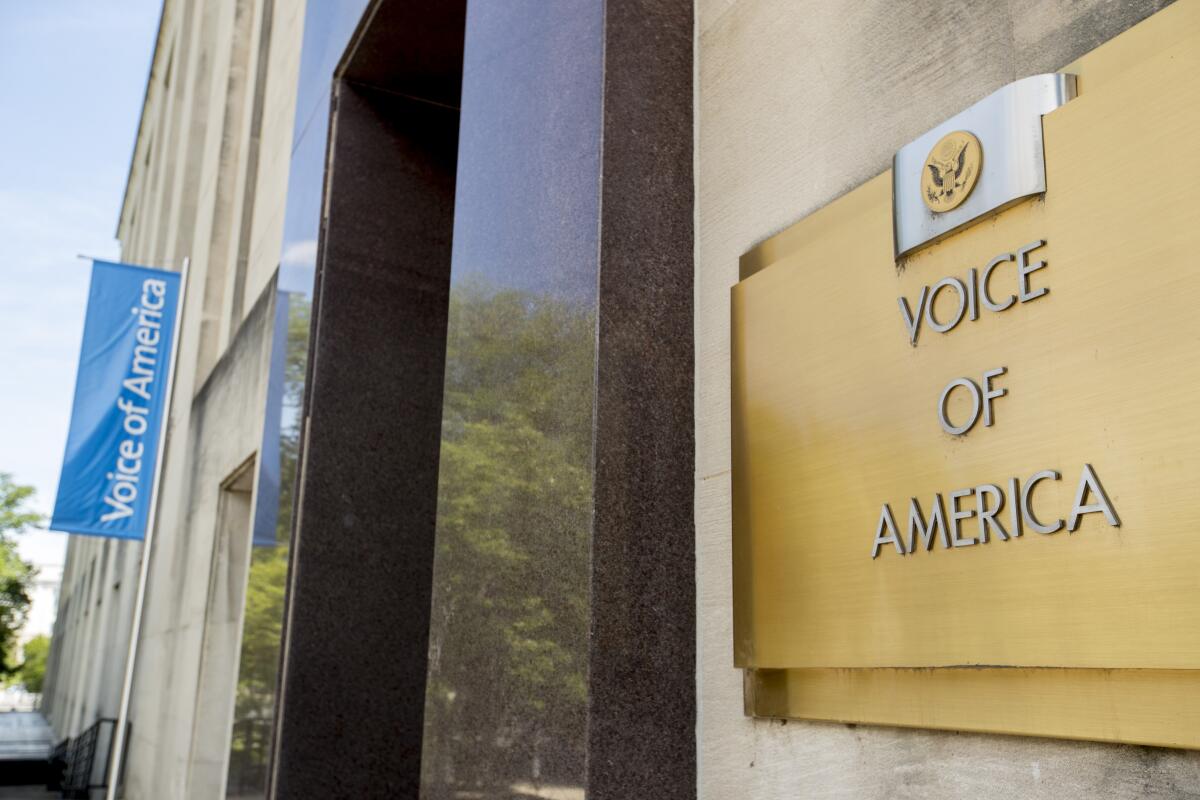Op-Ed: Trump has pulled out of the global battle for hearts and minds

Today a global battle of ideas is raging between representative democracy and authoritarianism. But instead of leading the forces of freedom in this epic clash, President Trump’s administration has laid down arms.
Both Russia and China have launched sophisticated communication strategies aimed at silencing their critics, shaping popular attitudes and undermining support for democratic institutions and values. These efforts have accelerated during the COVID-19 pandemic, with despots sensing an opportunity to put the champions of liberty further on the defensive.
The last time the West faced a comparable threat, during the Cold War, the United States and its allies mustered the resources required to engage in and ultimately win the ideological competition. A similar effort is urgently needed today. But instead, the Trump administration is dismantling the U.S. government’s existing information capabilities.
Especially troubling are the recent moves to gut the independence of the U.S. Agency for Global Media, which manages the country’s international broadcasting — including Voice of America, Radio/TV Marti, Radio Free Europe/Radio Liberty, Middle East Broadcasting Networks, and Radio Free Asia.
With some 3,000 employees and an annual budget that exceeds $700 million, the Agency for Global Media’s mission is to give people around the world what they deserve but are too often denied: information that is accurate, comprehensive and fair. Historically, when listeners have tuned in to these outlets, they could count on hearing from professional and independent journalists, not from government propagandists. Indeed, that is why they tuned in.
As the past has taught us, the truth needs allies precisely because it has enemies. During World War II, BBC broadcasts from London served to keep hope alive by delivering accurate news to captive populations and resistance groups throughout Nazi-occupied Europe. Following the war, the Voice of America and Radio Free Europe played a comparable role for millions trapped behind the Iron Curtain.
We saw the continued importance of these capabilities during the 1990s, when one of us served as U.S. secretary of State and the other as chairman of the Broadcasting Board of Governors, predecessor to the Agency for Global Media. During this period, extreme nationalists in the Balkans, Central Asia and parts of Africa used TV and radio stations under their control to spout hatred and advocate ethnic cleansing and even genocide. The United States and its allies responded with targeted broadcasts of our own, countering propaganda with facts, and vicious lies with balanced reporting.
Such efforts are a form of public diplomacy based not on self-serving fictions but on openness and truth. This is a tradition of which Americans can be proud and one that, in these difficult times, we should seek to reinforce. Instead, that tradition is under attack by the official who should be doing the most to uphold it: the president of the United States.
In April, the White House launched an extraordinary and baseless attack against Voice of America’s coverage of the COVID-19 pandemic. Then, last month, the Trump administration installed a documentary filmmaker with no professional qualifications, Michael Pack, as head of the Agency for Global Media. Within days, the director and deputy director of Voice of America resigned, and Pack fired the respected heads of three other networks — Radio Free Asia, Radio Free Europe/Radio Liberty and the Middle East Broadcasting Networks — as well as the Open Technology Fund.
Pack also dissolved the networks’ bipartisan advisory boards and replaced them with new panels composed of Trump loyalists — including Jonathan Alexandre, who serves as director of public policy for an organization designated by the Southern Poverty Law Center as a hate group for its anti-LGBT activism.
These moves undermine the credibility of our worldwide broadcasting efforts by threatening the firewall that has insulated them from political pressure. And there may be more alarming news to come. Pack has reportedly launched a case-by-case review of visas for foreign journalists working at the Agency for Global Media, raising fears that the reporters could be subjected to reprisal. As Matt Armstrong, a former Republican appointee to the Broadcasting Board of Governors, has suggested, these are all ways for Pack to influence coverage without directly intervening.
Fortunately, these measures have not gone unnoticed. There has been bipartisan outrage in Congress over the steps Pack has taken to weaken his agency’s independence. Among those raising objections have been two influential Republican Senators, Lindsey Graham and Marco Rubio. But speaking out will not be enough. Congress must, through vigorous oversight and legislation, prevent Pack from inflicting lasting damage.
If and when a new administration takes office in January, it will be critical for it to restore the agency’s reputation while also adapting its mission to meet this new era of ideological competition. In a world where Russia and China are actively spreading disinformation and propaganda, the United States must tell the truth — not as it is narrowly defined by ideologues of the left, right or center, but as boldly, broadly and free from bias as possible. America’s public diplomacy, as well as the future of democracy in the world, demands that we maintain this proud tradition.
Madeleine Albright was secretary of State under President Bill Clinton. She chairs the Albright Stonebridge Group. Marc Nathanson was chair of the U.S. Agency for Global Media from 1998 to 2002. He is currently co-chair of the Pacific Council on International Policy.
More to Read
A cure for the common opinion
Get thought-provoking perspectives with our weekly newsletter.
You may occasionally receive promotional content from the Los Angeles Times.










